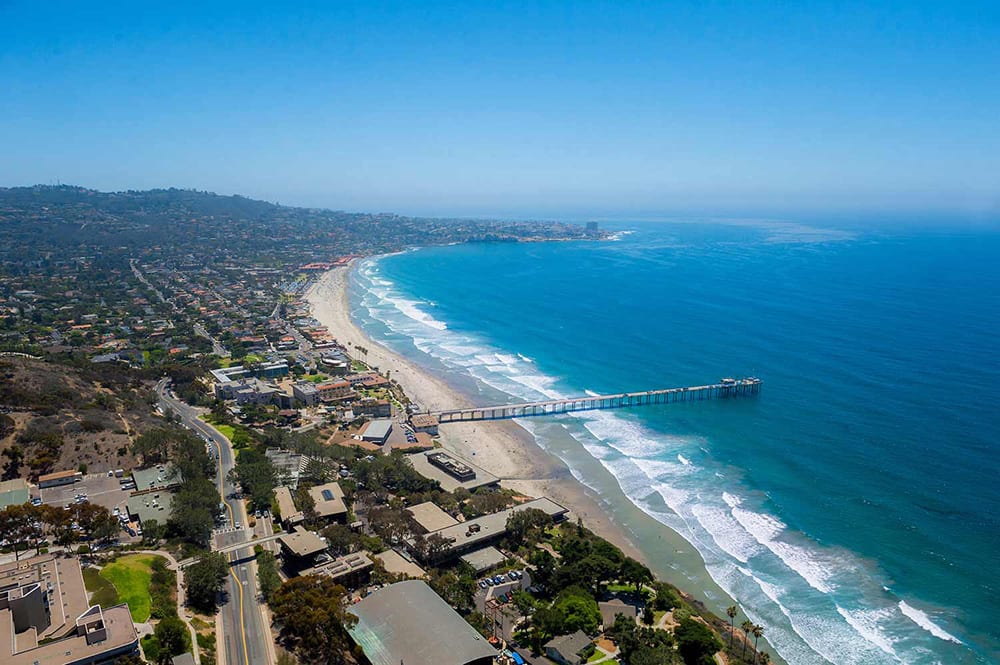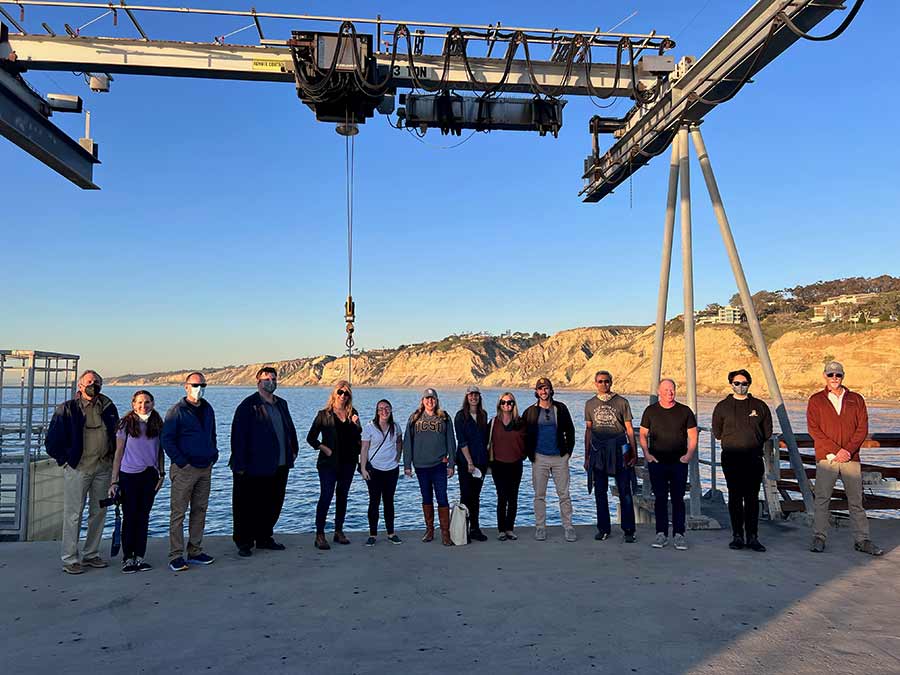UC San Diego is one of the world’s most prominent hubs for scientific and technological innovation focused on the world’s oceans, a status underscored by the startBlue Accelerator Program, a collaborative venture between Rady School of Management and Scripps Institution of Oceanography to promote blue technology startups. Now that startBlue’s first cohort is nearing its conclusion, the public will get a chance to see some of the ideas these ocean-inspired innovators are bringing to the marketplace.
On Wednesday, May 25 at Sumner Hall at Scripps Oceanography, seven teams from the first-ever startBlue cohort will showcase their ocean-focused startup solutions as part of startBlue Demo Day. Teams will present their pitches, demonstrate the progress they have made and announce their plans for the months ahead. Those interested in the blue technology space will have an opportunity to celebrate and network, and applications for startBlue Cohort 2 will officially begin. RSVPs for startBlue Demo Day should be received no later than Friday, May 20.
“We’re thrilled by what these tenacious innovators have already accomplished as part of this unique and powerful program,” said Vanessa Scott, co-lead of the startBlue Accelerator and director of corporate affiliates, business development, industry outreach and innovation for Scripps Institution of Oceanography. “Even more, we’re excited to see what they’ll accomplish now that they’ve experienced the benefits and opportunities startBlue creates for those in the blue technology space. Their results are a testament to the power of hard work and out-of-the-box thinking in addressing ocean challenges and the intellectual capital that UC San Diego and our program partners have to offer for future leaders in our region’s vibrant blue economy.”
Members of Cohort 1 are already making their presence known in the wider world of business. Algeon Materials, which leverages ocean-derived materials to create bio-innovative plastic alternatives, won first place in the April 2022 Triton Innovation Challenge. Kai Pono Solutions, creators of stormwater filtration technology, won second place in the environmental-focused business competition. CalWave Power Technologies, Inc., which unlocks the carbon-free power of ocean waves, was recently awarded funding from the U.S. Department of Energy to advance its X Wave technology.
“We aim to help decarbonize the grid and reach the U.S. goal of net-zero carbon emissions by 2050,” said Marcus Lehmann, CEO and co-founder of CalWave. “After years of engineering, our team was able to install our wave energy pilot unit off the coast of San Diego in September 2021 in close collaboration with Scripps Institution of Oceanography. StartBlue was a great opportunity to advance our collaboration with local researchers and industry experts, especially in the blue economy. UC San Diego and the startBlue Accelerator Program have truly shown support for blue technology innovators who are willing to think big. Thanks to our colleagues and mentors in startBlue, we are prepared to meet these challenges. I’m excited to see others take advantage of this critical opportunity that can shape the future of ocean-based startups.”

The CalWave prototype is deployed off the Scripps Pier with the help of Research Vessel Bob and Betty Beyster. Photo courtesy of CalWave.
StartBlue is an eight-month ocean technology-focused accelerator program launched in 2021 as part of UC San Diego’s StartR accelerator program, supporting the formation of advanced science and engineering startups tackling ocean-focused challenges and solutions integrated into science, industry, investment and government networks. Since 2012, StartR has graduated 239 companies, and Scripps and Rady have worked together to support over 80 new environmental startups from UC San Diego through entrepreneurship education and pitch competitions.
Active participation of program partners integrates startBlue into the pipeline of regional blue economy resources from formation to scale, including: The Port of San Diego and its Blue Economy Incubator: TMA BlueTech and its Blue Tech Incubator: U.S. Coast Guard Blue Tech Center of Expertise: National Defense Industry Association: the San Diego Military Advisory Council; AIIM Partners; AltaSea at the Port of Los Angeles; CA Sea Grant; the Brink Small Business Development Council; and Ocean Visions.
The startBlue program is made possible in part by the Economic Development Administration’s Industry Challenge Award, which provided $328,542 through its Build to Scale program. This grant is part of the U.S. Department of Commerce’s overall investment of $35 million in 2020 to fuel high-growth entrepreneurship across America. The startBlue program also received a local match of $328,542 donated by members of the Scripps Director’s Council and other philanthropic supporters.

The startBlue cohort takes a tour of the Ellen Browning Scripps Memorial Pier.
According to the World Bank, the blue economy is defined as the “sustainable use of ocean resources for economic growth, improved livelihoods, and jobs while preserving the health of ocean ecosystems.” The nation’s blue economy and its blue technology sector are rapidly growing to address the historic challenges and opportunities presented by climate change and the need for innovation posed by the U.N. Sustainable Development Goals.
According to a new report published in 2022 by TMA BlueTech, San Diego’s blue economy includes more than 4,320 maritime, water and blue technology establishments that generate $16.2 billion in direct revenues and provide more than 114,000 direct jobs, accounting for 5 percent of the business establishments in San Diego County and 9 percent of its total employment. America’s marine economy was worth about $373 billion as of 2018, per figures from the Department of Commerce.
Applications for startBlue Cohort 2 will be accepted starting at the conclusion of startBlue Demo Day and will remain open through July 8, 2022, providing a range of opportunities for early-stage teams addressing ocean-related challenges with science- or engineering-based solutions. Accepted startups will have access to training, hands-on experience, industry mentorship, technical support, fundraising opportunities and more. No affiliation with UC San Diego is required. Teams of at least two people must commit to participating in core events (weekly classes, biweekly site visits and workshops, showcase events, etc.) and meet a minimum of eight hours of mentoring time. Since startBlue is offered in person, a San Diego presence is required. Applications are available via the startBlue website. Mentorship opportunities for business leaders and community members are also available.
